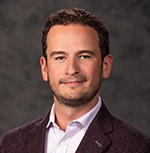Case-Based Session: Difficult Endometrial Carcinomas
This case-based slide presentation will cover pathologic features of selected types of endometrial carcinoma recognized as either emerging in the latest classification systems, or rare and therefore difficult to recognize.
Originally published on December 4, 2024
Lecture Presenter
 | Carlos E. Parra-Herran, MD Associate Professor of Pathology |
Dr. Carlos E. Parra-Herran is an academic gynecologic pathologist at Brigham and Women’s Hospital and associate professor of Pathology at Harvard Medical School. He graduated from Universidad Nacional de Colombia and completed his residency at Jackson Memorial Hospital, followed by subspecialty training at Brigham and Women’s Hospital and Sunnybrook Health Sciences Centre. His research focuses on the morphologic and molecular characterization of gynecologic tract neoplasia, particularly epithelial lesions of the lower genital tract, mesenchymal tumors, and nonserous ovarian neoplasia. He has authored over 100 peer-reviewed journal articles (original research and reviews) and edited three reference textbooks: Gynecologic Pathology, a volume in the "Foundations in Diagnostic Pathology" series, 2nd edition, Elsevier, 2020; Gynecologic and Obstetric Pathology, an issue of Surgical Pathology Clinics, Volume 15(2), Elsevier, 2022; and "Tumors of the Cervix, Vagina, and Vulva" in Atlases of Tumor and Non-Tumor Pathology, Series 5, American Registry of Pathology, 2023. He has served as teaching faculty for regional, national, and international continuing medical education events. He is also part of the organizing team for the International Society of Gynecological Pathologists (ISGyP) Live Virtual Education program. Dr. Parra-Herran currently serves as a member of the ISGyP board of directors and the United States and Canadian Academy of Pathology (USCAP) education committee.
Objectives
After this presentation, participants will be able to:
- Observe the salient histologic and immunohistochemical features of several types of endometrial carcinoma other than conventional types (endometrioid, serous, clear cell)
- Identify the most clinically important differential diagnosis of endometrial carcinoma
- Develop a language to convey instances of diagnostic uncertainty (in terms of histologic type)
Sponsored by:
University of Utah School of Medicine, Department of Pathology, and ARUP Laboratories
 Site Search
Site Search






